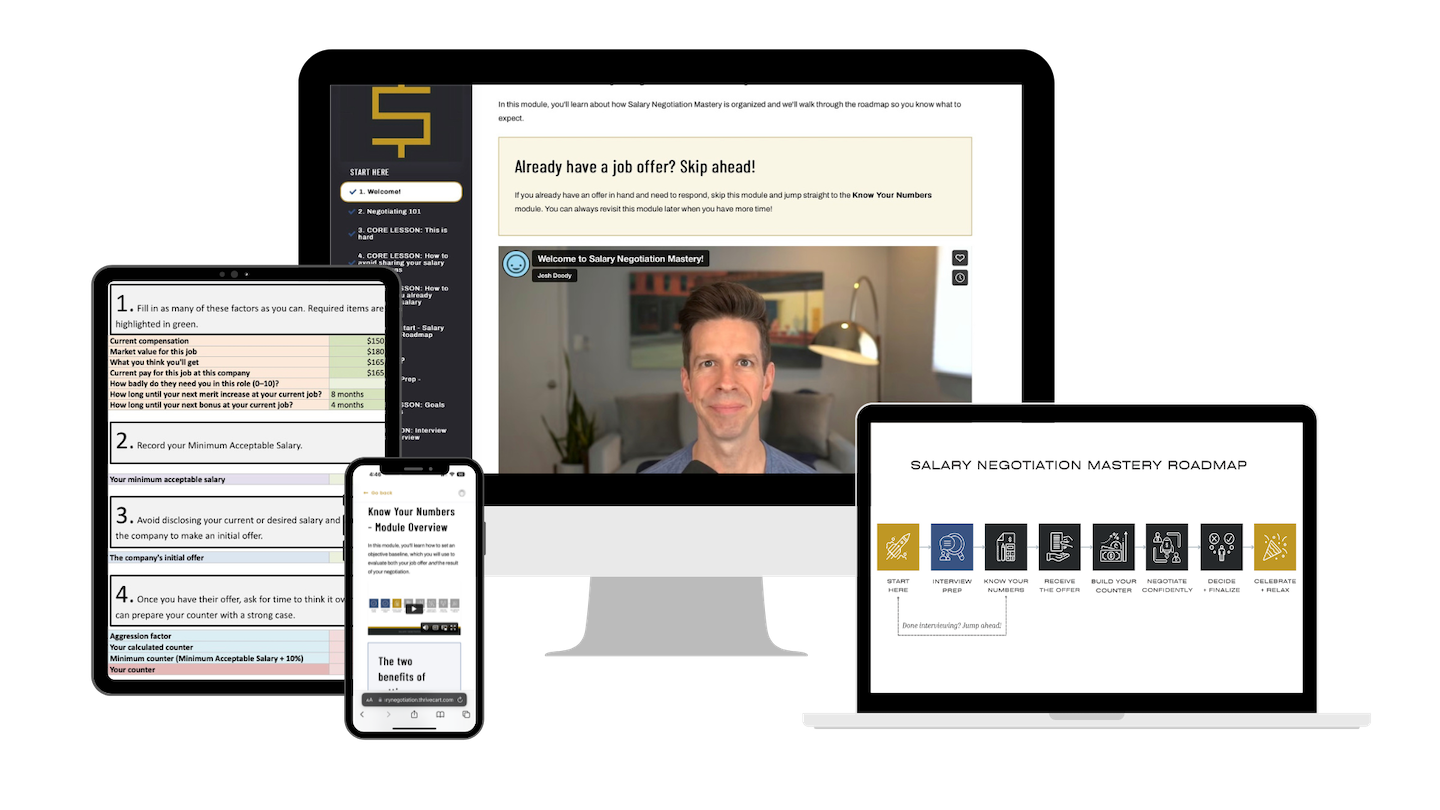Negotiating job offers
What to do when you have to respond to a job offer NOW
by Josh Doody
What do you do when you get a job offer with an expiration date? And what if that date is only a day or two away?
Expiring job offers are tricky because every situation is unique.
If you only have one offer to consider, then the solution is pretty simple: Negotiate the expiring job offer right away to get to the best result.
But what if you have other offers coming, and you want time to consider those as well?
Here are some things you can do to move forward while still using a solid strategy.
Ask for more time, then negotiate
The first thing I recommend after you receive any offer is to ask for time to consider it. It’s one of the first lessons in Salary Negotiation Mastery, and it’s the first thing I coach my clients to do. You need time to think, talk it over, etc. This is really important.
From there, you should continue moving the negotiation forward without explicitly sharing the details of competing offers among firms if you have them. I do think it’s a good idea to disclose competing offers in general (there’s an email template in the Complete Bundle for this as well), but not the details of those offers.
This way, you can get to the thing that matters—What’s the best possible offer I can get at this firm?—as quickly as possible. Part of responding to an expiring offer is asking for time. Another part is counter offering. Another part is discussing the final details. All of these things take time and they almost always reset the shot clock at every step.
Then, you might be in a place to ask for as much as several weeks to consider an offer, but it’s usually not necessary.
I’ve coached dozens of people and I don’t recall anyone ever needing several weeks to consider multiple offers - the negotiations themselves typically converge as companies become aware that other companies are in the mix for a good candidate.
Sometimes more nuance is required based on specific situations
When things require more nuance, I prefer to address those within the context of the specific situation via 1-on-1 coaching. Most expiring offers can be handled by asking for some time up front, or later disclosing that you have multiple offers and you are trying to make the best decision. When that won’t work, there are usually other factors at play, which are hard to account for in a single process. Folks in this tricky situation will usually get very high leverage from a strategy session, and it’s much easier to give useful, timely advice in this context.
Another perspective
Haseeb Qureshi ha a unique take on this sort of thing: Ten Rules for Negotiating a Job Offer
I like his article a lot. he makes some really great points based on his specific experience. But his experience is very specific, and I think his advice (which is basically, “Tell them you’ll walk if they don’t give you lots of time to think it over.”) is pretty specific to his experience. I prefer that my readers and clients don’t bluff, and most people would be bluffing if they said, “I’ll walk if you don’t give me more time.” or they would be very disappointed if the company actually said, “Ok, walk then. We’ll find someone else.” Haseeb had the luxury of walking away from lots of offers, but not everyone does.
But he also seems to prefer deferring the entire negotiation until he has lots of offers ready to negotiate. My strategy is to negotiate early and quickly, then compare opportunities and deal with the “timeline” issue only when it’s really necessary because multiple opportunities are very appealing.
I think this allows you to front-load your efforts to get the best offers possible and gives you more leverage when it’s time to talk about the timeline later on.
Final Thoughts
One reason I like to just negotiate the comp package up front is that it leaves out the “timeline” aspect of the negotiation, which the company may use as leverage. I prefer to say, “Ok, here’s the best and final comp package I can negotiate - thanks for working with me. Now, I need some time to think this over and talk about it with my family before I make my final decision about which opportunity is best for me. Is that ok?” Once they’ve gone through the entire negotiation with you, they’re very likely to give you whatever you need in terms of time.

